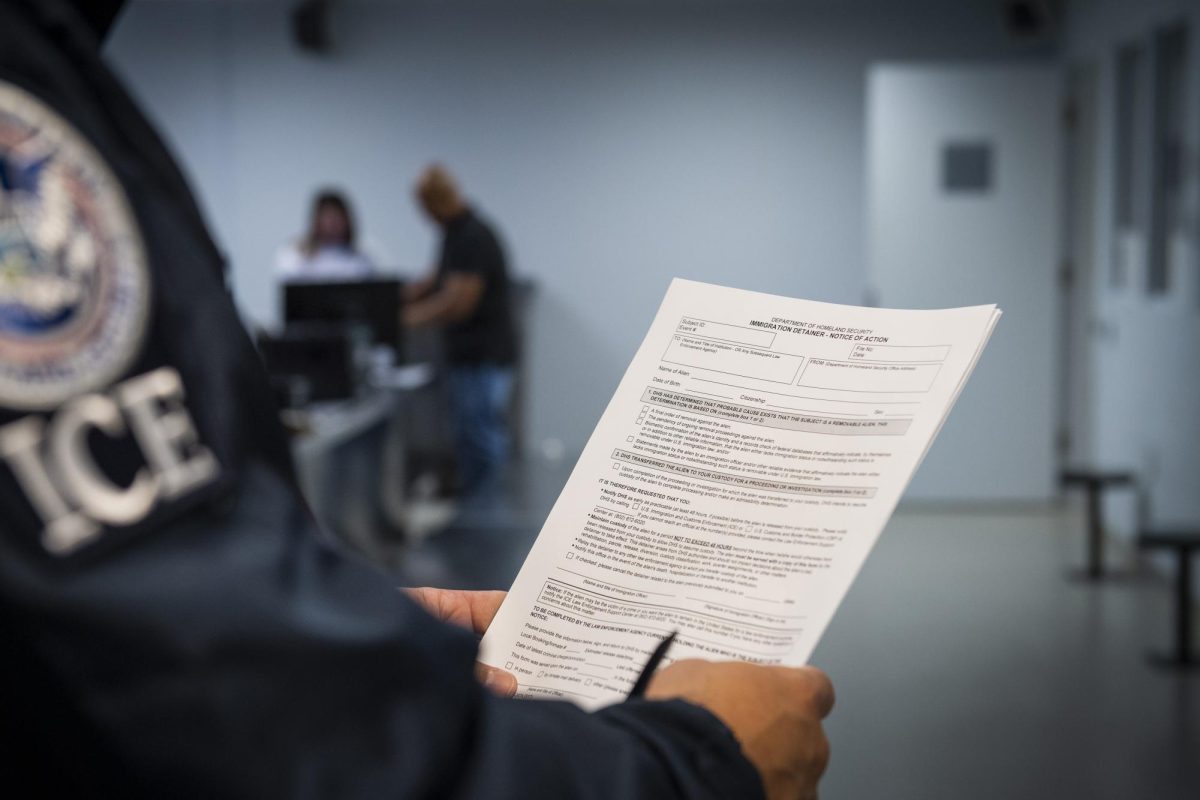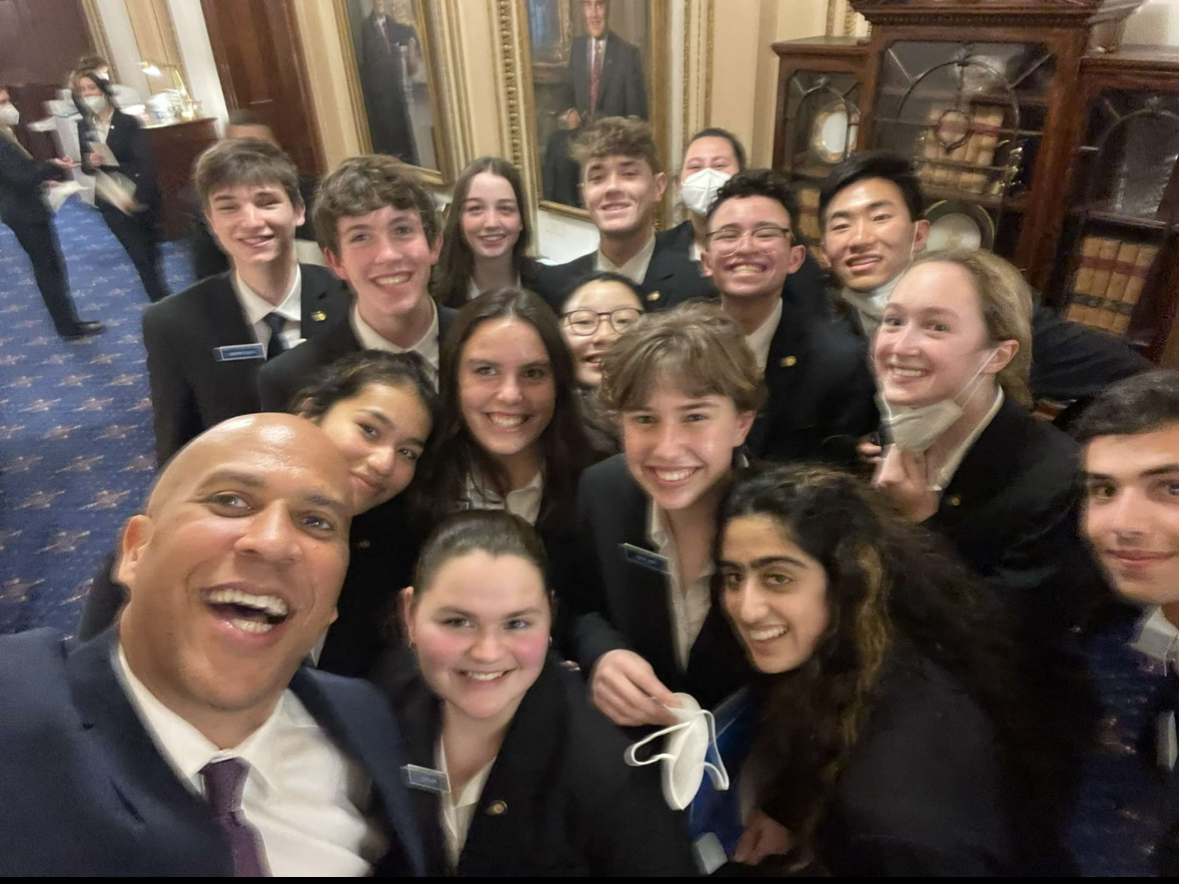On his first day in office in January, President Donald Trump rescinded the policy preventing U.S. Immigration and Customs Enforcement (ICE) agents from detaining migrants at sensitive locations such as schools, churches, and courthouses. President Trump has marked deportation as a key priority of his administration, fueling anxiety among some immigrant communities over ICE agents potentially seeking out their children while in school.
The Monroe-Woodbury community is no exception. The weekend after the executive orders, an English as a New Language (ENL) Orientation was hosted at North Main for prospective and current Monroe-Woodbury families. Prior to the executive order, tens of families had registered to join the event. As North Main prepared for the event, the administration announced the executive order. Only a small fraction trickled in over the hours of the orientation despite the large registration. Trays of uneaten bagels and cookies were taken home in bags by staff, student volunteers, and families at the conclusion to the event.
In the wake of the government’s actions, parents called administrators with concerns about how Monroe-Woodbury would be affected.
As a result, on January 23, Monroe-Woodbury sent an email in response to parents that read,
Dear Monroe-Woodbury families,
With the shift in national leadership, many policy changes are unfolding that have sparked discussions and questions among some of our families. We appreciate the open and honest communication from those who have reached out to district administrators. At Monroe-Woodbury, we remain steadfast in our commitment to providing quality education to all students in a safe environment, as reflected in our mission statement. We will stay focused on the care and well-being of every student, continuing this vital work in service to our school community. As a public school district, we are bound by the law. We will continue to carefully monitor and assess happenings, measure potential impacts to our district and await further guidance. Please reach out to your child’s building principal with any questions or concerns. We will share updates as information becomes available.
Warm regards,
Tracy Norman, Ed.D.
Superintendent of Schools
Principal of Monroe-Woodbury High School Mr. McElroy elaborated on the email: “I think the new policy changes at the federal level have people scared, concerned. So, the purpose of that letter was to calm people’s nerves and let them know that our goal, as always, is to keep our kids safe, provide social-emotional support, and to let people know that we’re here if they need us.”
As of late May, there have been no reports of ICE agents detaining children in schools. However, family separation due to deportation remains a possibility, according to Michael Wilk, immigration lawyer and Board Vice President of Refugee and Immigrant Support Services of Emmaus (RISSE). He has close to 15 years of experience in U.S. immigration law, and has represented asylum seekers and other clients pro bono.
Mr. Wilk is witnessing first-hand the impact of the new administration’s policies.
“What’s been changing for me over the past couple weeks with the change in administration is that I’m playing more the role of the triage nurse or the therapist. People are misinformed, people are scared, people are frantic. You can’t talk legal strategy if your basic needs are not being met,” said Mr. Wilk.
On the possibility of students being detained while at school, Mr. McElroy said, “Our concern at the district level, is less about coming into the school, and more about coming into the community and impacting families or parents while the kids are at school.”
Familial separation remains a potent reality for those with family at risk of deportation.
When two mothers were deported to Honduras this spring, their three U.S. citizen children moved with them. The Trump administration says the children were deported by their mothers’ request, while immigration advocates say they had little choice, according to PBS.
“What about our elementary kids? We have to make sure someone is there at the bus stop when they get off, and that someone is home to receive them, so those are some of the concerns,” said Mr. McElroy.
During detention, ICE agents are supposed to let detainees take reasonable actions to handle their affairs, like making a phone call to have a person pick up their child, according to Mr. Wilk.
Mr. McElroy shared the Monroe-Woodbury protocol for immigration enforcement, which is not dissimilar to protocols for other enforcement. At the security booth, any agents will be verified by their identification, and then administration will be notified. Federal-level agents, including ICE, require district intervention.
District administration will meet with the agents and then proceed from there. The district has access to immigration attorneys to aid in this process. A subpoena or warrant is required if the agents want to detain anyone inside the school.
There are two kinds of warrants commonly presented by ICE: a judicial warrant and an administrative warrant. A judicial warrant is signed by a judge and grants ICE the authority to enter locations such as businesses, homes, and schools.
An administrative warrant is an internal ICE document that, unlike a judicial warrant, does not give agents the power to enter a private location if the owner does not consent. It will typically only have the signature of the ICE agent.
If ICE knows the location and identity of an immigrant with a reason to bring them into custody, they are likely able to obtain a judicial warrant, according to Mr. Wilk.
People present within have the right to remain silent but may not obstruct the proceedings. This protocol has been shared with staff such as school safety officers, greeters, and teachers.
“We’re not handing over children, right? And it’s not a mass thing. So, it would be very specific if they did come to the building,” said Mr. McElroy.
According to Mr. McElroy, Monroe-Woodbury has no information on the immigration status of students. As students have a right to education in New York regardless of immigration status, this is not information New York school districts solicit.
“It’s all very new, and I think all districts are trying to learn as much as they can and navigate the new policies. So, I think as we know more, as the attorneys have more information, as the government makes things more clear, then we can communicate more,” said Mr. McElroy.
For immigrant families, the future remains uncertain. The rapidly changing nature of immigration enforcement today breeds misinformation, according to Mr. Wilk.
Beyond Monroe-Woodbury, the federal government is fighting a larger battle with the states. Monroe-Woodbury is located in New York, a traditional hub of immigration, concentrated in the melting pot of New York City. An estimated 616,300 undocumented immigrants live in New York.
New York Attorney General Letitia James issued a statement that New York will not break its own immigrant protection laws to comply with federal immigration enforcement, alongside 10 state attorneys general. The state attorney general advised local law enforcement agencies to adhere to the protections afforded by New York and the U.S. Constitution to undocumented immigrants.
New York continues to affirm the right of undocumented students to an education. The Attorney General filed a lawsuit against Trump’s executive order to end birthright citizenship, which they allege violates the 14th Amendment.
As far as federal protections, the Supreme Court ruled in 1982 that children cannot be denied a public education due to their immigration status unless there is a substantial state interest.
“There’s a lot of things that the school can do, you know, with the power of their position, the power of the state, to block direct interaction between ICE agents and children. Operative word there being can, right? They can use those protections to block direct interaction. But as we’ve seen, not all schools are doing that,” Mr. Wilk said.
Many of New York’s elected officials have taken a strong stance against the Trump administration’s new immigration policies, while other states have generally been more welcoming to ICE intervention in its communities.






































